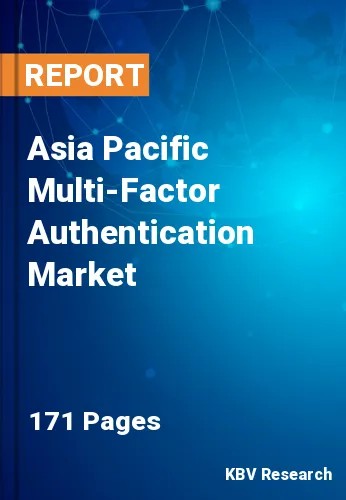The Asia Pacific Multi-Factor Authentication Market would witness market growth of 16.0% CAGR during the forecast period (2023-2030).
The financial industry is a prime mark for cyberattacks due to the valuable data it stores, including personal and financial information. It is extensively used to secure online banking, mobile banking applications, and financial trading platforms. For example, users may need to provide a password, a one-time code sent to their mobile device, and a fingerprint scan to access their bank accounts. Healthcare organizations handle sensitive patient data and must comply with stringent data protection laws such as HIPAA. MFA is applied to electronic health records (EHR) systems, telemedicine platforms, and patient portals to ensure that only qualified personnel can access patient information and medical records.
Government agencies and public services manage vast amounts of confidential data. It is deployed to secure access to government systems, citizen portals, and law enforcement databases. This is especially critical to prevent unauthorized access to sensitive information. Industries such as energy, utilities, and transportation rely on critical infrastructure systems that control vital services. MFA protects these systems from cyberattacks that could disrupt vital services, such as power grids and transportation networks. The versatility of MFA in securing various industries highlights its adaptability and critical role in maintaining the integrity of systems and data across diverse sectors. The applications extend beyond these examples, illustrating the universal need for strong authentication across the digital landscape.
Many countries in the Asia-Pacific region are undergoing digital transformation, which involves a shift toward online and mobile services. Several countries in Asia-Pacific have implemented or are considering data protection regulations and cybersecurity laws that require strong authentication. Compliance with these regulations is driving MFA adoption. Many businesses in Asia-Pacific are engaged in research, development, and innovation. MFA protects intellectual property and proprietary information from unauthorized access and theft. The aforementioned factors will significantly expand the market growth across the region.
The China market dominated the Asia Pacific Multi-Factor Authentication Market by Country in 2022, and would continue to be a dominant market till 2030; thereby, achieving a market value of $3,200.2 million by 2030. The Japan market is registering a CAGR of 15.3% during (2023 - 2030). Additionally, The India market would experience a CAGR of 16.7% during (2023 - 2030).
Based on Component, the market is segmented into Software, Hardware, and Services. Based on Authentication Type, the market is segmented into Password-Based Authentication, and Passwordless Authentication. Based on Model Type, the market is segmented into Two-Factor Authentication, Three-Factor Authentication, Four-Factor Authentication, and Five-Factor Authentication. Based on Vertical, the market is segmented into BFSI, Government, Travel & Immigration, Military & Defense, Commercial Security, IT, Telecommunication, Healthcare, Media & Entertainment, and Others. Based on countries, the market is segmented into China, Japan, India, South Korea, Singapore, Malaysia, and Rest of Asia Pacific.
Free Valuable Insights: The Global Multi-Factor Authentication Market is Predict to reach USD 41.5 Billion by 2030, at a CAGR of 15.2%
The market research report covers the analysis of key stakeholders of the market. Key companies profiled in the report include Microsoft Corporation, Thales Group S.A., CyberArk Software Ltd., Broadcom, Inc., Micro Focus International PLC, HID Global Corporation, Cisco Systems, Inc., Oracle Corporation, RSA Security LLC, and Salesforce, Inc.
By Component
By Authentication Type
By Model Type
By Vertical
By Country
Our team of dedicated experts can provide you with attractive expansion opportunities for your business.

